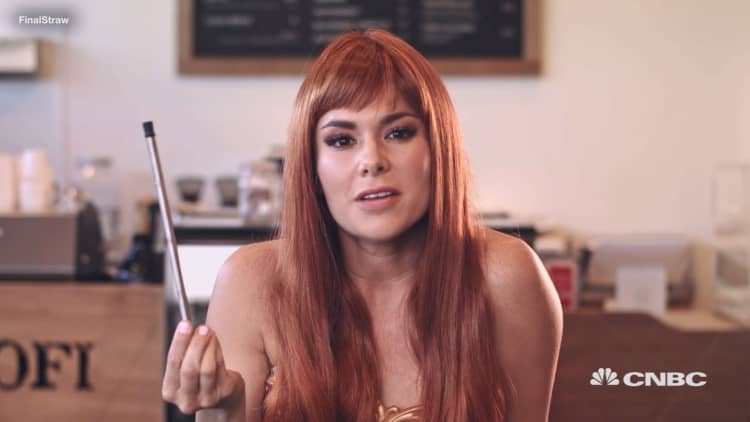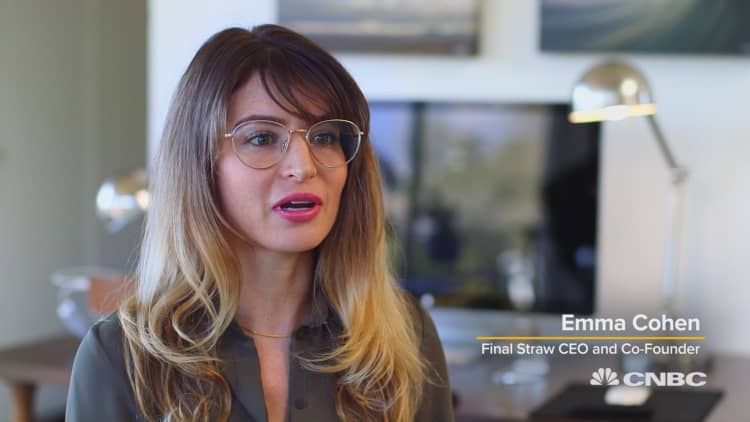
The business started out beyond Emma Cohen's wildest dreams, but soon she discovered a threat to the brand she was building.
Her company, FinalStraw, makes an environmentally friendly reusable straw. It took off on crowdfunding website Kickstarter about year ago. And then a few months later, in October, it got to pitch its product on ABC's "Shark Tank." But soon after launching, Cohen realized she had an unexpected problem — loads of counterfeits were coming to market from across the globe.
"The whole point of the company is to reduce single-use plastic waste. And when people get one of these [knockoff straws], and they open it up, and it doesn't work, and it only cost $5, guess where it's going? It's going in the trash," said Cohen, FinalStraw's CEO. "The entire mission of what we're trying to do as a company has been defeated by these fake FinalStraws."
By comparison, FinalStraw sells its collapsible straw for $25. It comes in a carrying case with a cleaning brush. In 2018, the brand made $5 million in revenue, according to Cohen.
FinalStraw's problem isn't unique. Copycatters are monitoring crowdfunding platforms like Kickstarter and watching for trendy products to go viral, according to Amedeo Ferraro, an intellectual property attorney.
The situation is an example of U.S. complaints about China's theft of intellectual property. That's one issue in the trade war between Washington and Beijing.
"We were just hoping and praying to sell enough straws that we wouldn't have to make them ourselves," said Cohen, who co-founded FinalStraw with Miles Pepper, reflecting on the decision to use Kickstarter.
"And within 48 hours of launching the Kickstarter, we'd raised over $200,000," she said. "We went from zero to 60 real fast."
FinalStraw was hoping for just $12,500 but quickly surpassed that goal. The company ultimately raised nearly $1.9 million on Kickstarter, but within weeks Cohen said she began seeing copies coming from China.
On "Shark Tank," Cohen and her partner received two offers but did not make a deal. One of the Sharks asked about counterfeiting.
"It took us about nine months to create the tooling, get the product ready to manufacture. They were able to do it a matter of weeks," she said.
FinalStraw launched on Kickstarter with a provisional U.S. patent. After raising funds, the company applied for and was granted a utility patent. Still, it's an ongoing battle.
"A patent is only as good as its enforcement," Cohen said. "It's essentially a nice, shiny, expensive piece of paper that we then need to go out and enforce."
On Chinese e-commerce site Alibaba and other major retail websites, CNBC found many listings for what appear to be knockoff FinalStraws. One was even using images from the brand's Kickstarter campaign.
One company located in Shenzhen, China, responded to an email from CNBC and said that it could make the straws and emailed pictures that look similar to FinalStraw. CNBC called the contact listed on Alibaba to visit the factory and get more information but the spokeswoman declined to comment.
CNBC sent a team to Shenzhen to find other companies selling similar straws online. At least one of companies was not at the address listed online. Chinese laws allow different companies to register under one address, depending on the business scope.
The team also visited a factory that produces similar straws but could not enter.
A contact from another company that sells similar straws online, told CNBC by phone that the idea for the straw came from a crowdfunding internet company. The contact who only gave his last name Wu also said the straw is mainly sold in Europe and America.
The copycat straws sell for as little as a dollar when sold at wholesale. Cohen says the price different comes down to quality.
"We get angry emails all the time from customers who are confused as to why the quality of the product that they ordered is terrible," Cohen said. "The scariest thing is that there is no regulation on the materials that they're using. There's no quality control."
Cohen showed CNBC copycat straws that did not pop into position to allow drinking the same way her company's straws did.
CNBC Beijing purchased a copycat straw and asked Chinese product designer Bruce Qin to test it.
"It's not a good product," he said. The real FinalStraw comes with a cleaning tool and a drying case so it can reused over and over. Qin said the cleaning tool in the copycat straw seemed like it would break easily.
Alibaba originally agreed to an interview with CNBC but then declined hours before it was scheduled.
"Protecting the IP of rights holders around the world is critical to our business. … We remove any IP infringing listings, period. Rights holders can enforce their IP rights outside China, e.g. U.S. patent rights, on our cross-border platform," an Alibaba spokesperson said in part in a statement sent by email. "The fact that 180,000 brands and millions of SMBs [small and midsize businesses] operate on Alibaba's platforms demonstrates the trust they place in us, and we will continue to work tirelessly to protect brands of all sizes and consumers."
After CNBC contacted Alibaba, the company began helping FinalStraw.
"Once we understood the nature of their IP, we worked quickly and collaboratively with FinalStraw to remove suspected infringing listings, and continue to closely partner with them on the removal of the few that require additional analysis," the spokesperson said.
The battle with the copycats has cost the company millions, according to Cohen. FinalStraw has 16 contractors working for the company, three of whom work to fight fraud. Cohen says she is also paying two attorneys.
"It's also very burdensome on our resources, because this is time that my staff could be spending doing way more productive things, versus just fighting off these knockoffs," Cohen said.

Some of the impostors set up fake websites that look like the real one. Cohen showed CNBC one website that showed the same bio and images of the company's team that the real website does. The copycats even copied the picture of Cohen's dog.
Cohen and her team are working to take down the impostors.
"Most of them were offshore. And it was, first of all, very difficult to find a person. They have good ways of hiding," said Ferraro, who works with FinalStraw. "Once we finally got to them, wrote to them, some of them were taken down. But then they started popping up again."
Ads for the fake straws also can be found on social media.
"We were seeing advertisements. And they were all using our own materials. But they were directing to different websites," Cohen said. "Social media is a weapon for these impostors. They can use it at their discretion however they want. And there's nobody out there that's really enforcing it."
Some of the posts were by people known as influencers, people who are paid by companies to make posts promoting companies. Many of these influencers have meme accounts where they post funny images or videos and often stay anonymous.
Use of influencers is a growing part of marketing. Eight-six percent of marketers used influencers in 2017, the latest numbers available, according to Linqia, a marketing agency that connects brands with influencers.
It can be difficult for influencers working with small businesses to tell which ad requests are legitimate.
One influencer, Emily, who posted a fake FinalStraw ad, said she had no idea the ad was fake until CNBC contacted her. The influencer asked CNBC not to use her last name because her account is anonymous. She has over 1 million followers. CNBC is not naming her account since it contains adult content.
Emily said she was approached by a company to post the straw on her account. She said originally she did not respond, but when they contacted her again a few months later and had customer reviews, she agreed to post the ad and received a payment for an undisclosed amount.
Emily said that while she does try to determine whether a product is legitimate, digging to find that information can be hard work.
"I don't know if it's me, but I'm a trusting person," she said in a phone interview. "Why would someone spend this money on an ad that's not legitimate?"
Another account, Funny.window, posted a video with Cohen and the straw in it, but linked to a different seller.
"I can't know who the real legitimate of a product is [sic]," Eugene, who runs the account, said in an email. Funny.window has 1.2 million followers.
Other influencers take a different approach. Joey Hickson, who has about 17 million followers across three accounts — including his popular meme account @lmao — has a team of people helping to manage his business, which makes it easier to weed out bad actors.
He said both Instagram, as well as influencers, need to work to stop the proliferation of ads for fake products.
"We can't just put all the blame on Instagram, because that's not fair," he said. "I think we have our own social compass that we should look at."
Justin Keller, Hickson's manager, said there is very little regulation of these types of transactions.
"It's the Wild West," he said. "It's like a gold rush."
"We review every IP report we receive and take action to protect rights holders when someone has used their IP without permission," an Instagram spokesperson said in a statement sent by email. "When it comes to partnering with brands, we encourage creators to act responsibly and with integrity."
The FBI said the agency has seen similar incidents.
"One of the prime examples of that is the hoverboards that came onto the scene a couple Christmases ago, where the counterfeiters — actually the hazardous devices that are being marketed as genuine products — got to market before the actual genuine product did, and obviously those products were dangerous and could catch fire," said Steven Shapiro, unit chief for the FBI's intellectual property rights unit.
To protect their business, companies may want to consider other methods of funding besides crowdfunding or make sure its intellectual property is secure before launching.
"If there is another alternative source of funding like private venture capital or any other way of funding, I would suggest doing that first. But that isn't something that's available to everyone," Ferraro said.
FinalStraw is still working on getting a patent and trademark in China. Not having them makes it more difficult for it to fight copycats there. It's a problem Chinese product designer Qin knows very well. He said his own designs have been knocked off by local factories.
"Without a Chinese patent, you probably would be copycatted," Qin said.
Kickstarter said it is aware of copycats that have happened to other entrepreneurs who launched on its site.
"It depends on the product. But if you're coming to Kickstarter to raise funding, you probably want to have all of your protection in place before you launch. That is very important," said Clarissa Redwine, Kickstarter's senior design and technology outreach lead. "Once you launch your product is out there in the world."
Disclosure: CNBC owns the exclusive off-network cable rights to "Shark Tank."

